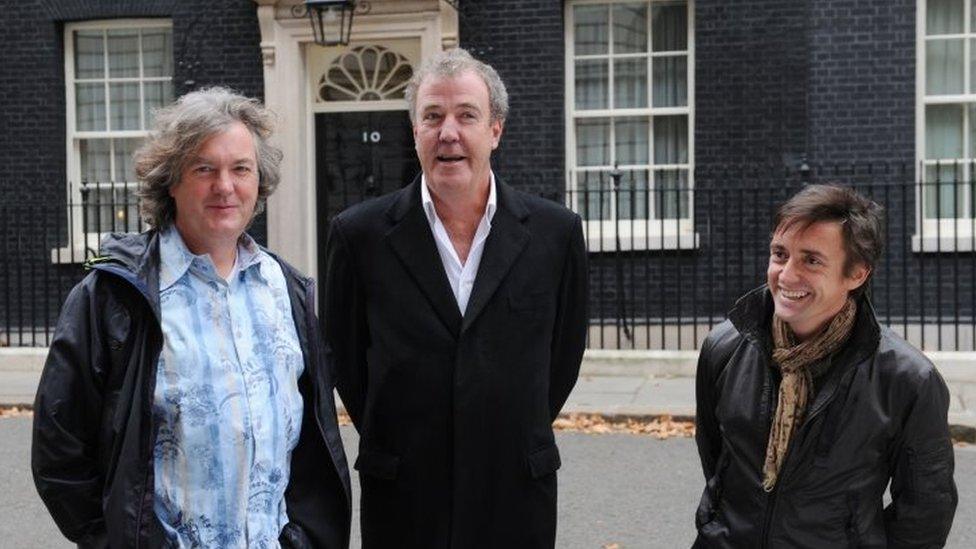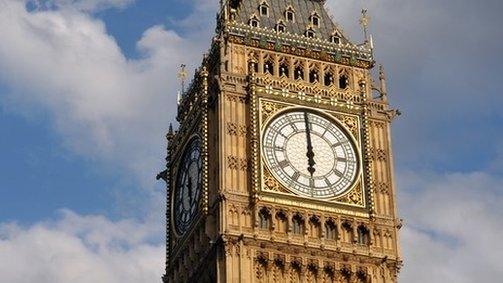Are e-petitions a waste of time?
- Published

Beekeepers protest at Parliament in 2013
Members of the public have a new way to influence what is debated in Parliament - a re-launched and beefed up e-petitions system. Will it improve engagement between the people and their representatives - or is it all just window dressing?
Camilla Goddard maintains over 60 hives across London and is just one of many in her industry concerned about the effect that neonicotinoid pesticides can have on bees.
"Bees are having a hard time anyway, with parasites and variations in the weather every year. I've had instances of bees being killed by pesticides. It's a horrible thing to see."
The government temporarily lifted a ban on neonicotinoids in certain parts of the country, earlier this year - a decision which was described as "scandalous" at the time by environmental groups.
Now that cause has been taken up by Liz St. Clair, an "amateur gardener" who is using the new system to raise awareness of the plight of bees and has gathered over 85,000 signatures for her e-petition, external.
"I saw that there were several campaigns out there to try to stop these pesticides from being reintroduced into British fields.
"The government isn't obliged to take notice of anybody else's petition, but they'll be obliged to take notice of something on their own website."

E-petitions - a brief history

Downing Street launched an e-petition site in November 2006
It proved instantly popular with 2,860 active petitions being set up in the first six months
Almost 1.8 million people backed a petition calling on Tony Blair's government to "scrap the planned vehicle tracking and road pricing policy"
An unnamed government minister branded the site an own-goal thought up by a "prat" - but road pricing disappeared off the government's agenda
More than 50,000 people backed a petition calling for Jeremy Clarkson to be made prime minister prompting a jokey YouTube response from No 10, external
Other spoof petitions on the now defunct Downing Street e-petitions site included a call for Spandau Ballet's Gold to be made the national anthem
In 2011, the coalition government launched a new e-petition site, with the prospect of a debate if 100,000 signatures are reached
In the same year, the Obama administration launched its We the People e-petitions site, external, although it has been criticised as a PR exercise

Under the previous system, petitions were directed to government departments rather than MPs - just over 30 were debated in four years.
Now when a petition that passes 10,000 signatures, it receives a response from the government, and there's a new cross-party committee of MPs which will look at each petition that gets 100.000 signatures and consider it for a parliamentary debate.
Labour's Helen Jones, who chairs the Petitions Committee, external, said the difficulty at the moment was juggling the volume of petitions submitted with the amount of time available for debates to take place.
Ms Jones also said the committee will also be able to consider whether to hold debates on subjects that fail to reach the 100,000 threshold but are "worthy of debate but would not get time elsewhere".
"We're going through a process of learning ourselves how to deal with petitions, but also of engaging the public to allow them to understand what can be done and what can't be done.
"That's a two-way process and will take some time."
'Secret ballot'
Lord Lisvane, the former clerk of the House of Commons, and an now a crossbench peer, said that petitions had been around for "almost as long as parliament has been around".
"Petitions were the origin of legislation, and were a way of saying 'fix this'.

People respond to 'crowd feelings', argues Roger Scruton
"The secret ballot, universal male suffrage, the abolition of the slave trade - they took a long time to come about, but they started through a process of petitioning."
Anyone can start a petition, as long as they are a British citizen or a UK resident.
More than 1,400 have chosen to so far, on topics as diverse as the introduction of mandatory drugs tests for MPs, the introduction of a UK national day, and minimum prices for milk.
Campaigns can quickly go viral on social media, gathering thousands of supportive signatures in a few hours.
But some question whether responding to this form of campaigning, however popular, is an effective use of politicians' time.
'Raising a topic'
Philosopher Roger Scruton argues that we elect our MPs to represent our interests and think seriously about issues.
"People are social animals who respond to collective emotions, they can respond to crowd feelings.
"We all know that we can feel these crowd emotions at one moment and retire to our private quarters and recognise that we were wrong.
"We want MPs to be the same, not just to be driven along on the whims of collective emotion, as though they were not duty bound to think things through."
Several parliamentary debates which were prompted by e-petitions have already taken place, on contracts and conditions in the NHS, the legalisation of cannabis and immigration.
Currently the ten most popular petitions on Parliament's website have collectively attracted some 1.7m signatures of support.
A debate in Parliament is a good way to raise the profile of an issue with law makers but it does not automatically follow that there will be a change in the law.
Labour's Helen Jones warns that signing a petition is only the first move towards achieving change.
"It's not the end, it is a way of raising a topic, getting it on the radar and getting it talked about.
"But I think it's very important that people realise that getting a debate is often only the beginning of the process."
- Published20 July 2015

- Published4 December 2014

- Published17 August 2012
